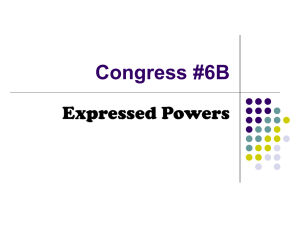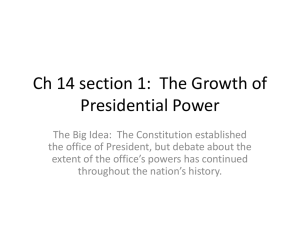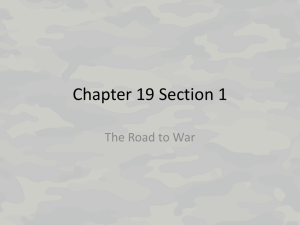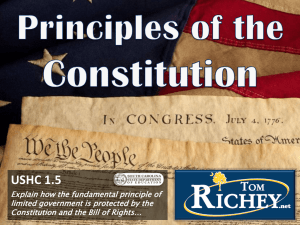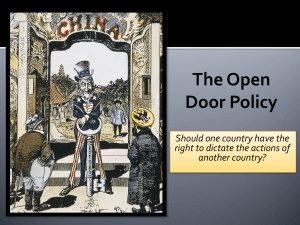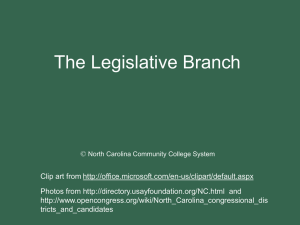Powers of Congress - SkinnerClassNotes
advertisement
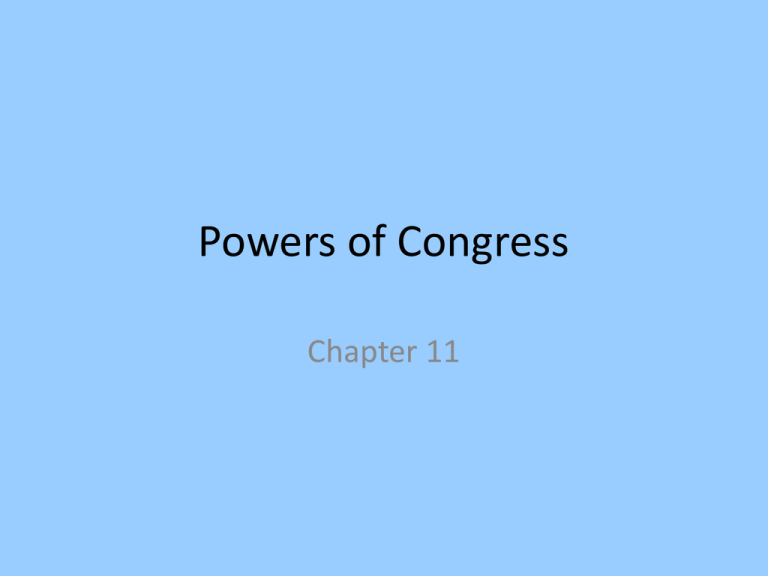
Powers of Congress Chapter 11 Chapter 11 Section 1 THE SCOPE OF CONGRESSIONAL POWERS Congressional Power • Only has powers delegated to it by the Constitution – Expressed: in specific wording – Implied: reasonable deduction from expressed powers – Inherent: powers held by all national governments Strict Versus Liberal Construction • Strict Constructionist: those who insisted that Congress should only be able to exercise its expressed powers and only a few implied powers Strict Versus Liberal Construction • Liberal Constructionists: favored a broad construction of the powers given to Congress. Chapter 11 Section 2 THE EXPRESSED POWERS OF MONEY AND COMMERCE Article I, Section 8 • This is where the majority of Congress’ powers come from. – 18 separate clauses – 27 different powers explicitly given The Power to Tax • Tax: a charge levied by government on persons or property to meet public needs. • Power is limited – – – – – No church taxes Poll taxes Only for public purposes No taxes on exports Direct taxes must be apportioned among the states according to their populations – All indirect taxes must be levied at the same rate in all parts of the country (tobacco) The Borrowing Power • The power to borrow money on the credit of the United States – Deficit financing: the US spends more than it makes – Public Debt: all money borrowed not yet repaid, plus interest. • http://www.brillig.com/debt_clock/ The Commerce Power • Congress’ power to regulate interstate and foreign trade • Gibbons v. Ogden, 1824 – New York v. Federal Gov’t with regulation of steamboats – Court’s ruling ends shipping monopolies based on commerce The Currency Power • The power to coin money and regulate it’s value • The Bankruptcy Power – Congress may establish uniform laws for bankruptcy across the U.S. • The distributing of assets to those who one owes debts Chapter 11 Section 3 OTHER EXPRESSED POWERS Foreign Relations Powers • Many powers expressed • Matters affecting security of nation or immigration are inherent powers • War Powers – 8 of the listed powers deal with war and national defense Other Expressed Powers • Naturalization: process by which citizens of another country become citizens of the U.S. • Postal Power: establish post offices, and routes. • Copyrights and Patents: • The exclusive right of an author to reproduce, publish, and sell his or her creative work. – Life of author, plus 70 years • The sole right to manufacture, use, or sell “any new and useful art, machine, manufacture, or composition of matter, or any new and useful improvement thereof.” – 20 years, may be extended by act of Congress Other Expressed Powers • Weights and Measures: “fix the standard of weights and measures.” – 1838 established pound, ounce, mile, foot, gallon, quart, etc… – 1866 legalized use of metric – 1901 National Bureau of Standards in Commerce Department Power Over Territories and Other Areas • Eminent Domain: the inherent power to take private property for public use. • May also acquire property through purchase or gift. • Manage territories – District of Columbia, – Puerto Rico, – Guam, – Virgin Islands Judicial Powers • They create all federal courts below the Supreme Court • Define federal crimes and establish their punishments Chapter 11 Section 4 THE IMPLIED POWERS Necessary and Proper Clause • Article I, Section 8, Clause 18 – Where it draws its implied powers • McCulloch v. Maryland, 1819 – Supreme Court ruled for McCulloch under the Necessary and Proper Clause – Decision written by Chief Justice John Marshall The Doctrine in Practice • Doctrine: is a principle or fundamental policy. The doctrine of implied powers has been applied in instances too numerous to count. Chapter 11 Section 5 THE NON-LEGISLATIVE POWERS Electoral Duties • The House of Representatives may be called to elect a President if no candidate receives a majority of the electoral votes. – 12th Amendment, each state gets 1 vote, must win majority – Also chose VP, but by individual vote of Senate • Thomas Jefferson 1801, John Quincy Adams 1825 • VP Richard M. Johnson 1837 Impeachment • All civil officers of the U.S. may “be removed from office on impeachment for conviction of, treason, bribery, or other high crimes and misdemeanors.” – Military officers are not considered “civil officers”, nor are members of Congress. • House has sole power to impeach • Senate has the sole power to try, to judge. • Requires majority vote in House, 2/3 vote in Senate Impeachment • Andrew Johnson 1868 • Senate acquit • Based on his breaking a law that was passed after he vetoed it • Bill Clinton 1998 • Senate acquit • “inappropriate relationship” with a White House intern Executive Powers • Two executive powers given to the Senate – Appointments: all made by President must be confirmed by Senate • 12 of 600 appointments have been rejected – Treaties: made “by president with advice and consent of the Senate,….provided two thirds of the Senators present concur.” Investigatory Power • May investigate any matter that falls within the scope of its legislative powers.
